
Welcome to the new era of the Traverse City Film Festival, founded and curated by Oscar-winner Michael Moore. 52 great movies in 52 weeks! A year-round festival of powerful, subversive, indie masterpieces made with the belief that cinema can save the world — and that one great movie can change your life.
SEASON 4
SCHEDULE
Summer
JULY
OUTSTANDING ARTHOUSE
AUGUST
It’s the month of the LOST GEMS — the OVERLOOKED, the UNDERAPPRECIATED, the FORGOTTEN, and the CENSORED — from over 100 years of cinema!
SEPTEMBER
DEMOCRACY ON FILM
“See It Before It’s Gone!”


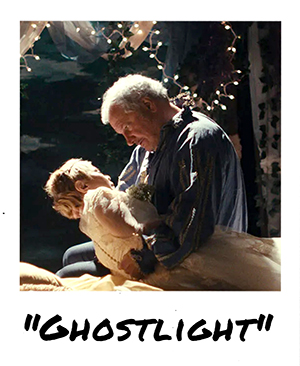 In every theater in the world, when the play is over each night and the audience is gone, one solitary floor lamp in the center of the empty stage holds a single incandescent bulb that has been left on to help the mythical ghost that resides in every theater find its way. It’s called a “ghostlight.” In this compelling drama, a lost family finds their way out of their grief through, of all places, a crappy community production of Romeo & Juliet — proving that in the darkest of moments, art remains a guiding light and a force to heal. A huge hit at this year’s Sundance Film Festival. “This may be the most emotionally powerful film I’ve seen this year.” (Michael Moore)
In every theater in the world, when the play is over each night and the audience is gone, one solitary floor lamp in the center of the empty stage holds a single incandescent bulb that has been left on to help the mythical ghost that resides in every theater find its way. It’s called a “ghostlight.” In this compelling drama, a lost family finds their way out of their grief through, of all places, a crappy community production of Romeo & Juliet — proving that in the darkest of moments, art remains a guiding light and a force to heal. A huge hit at this year’s Sundance Film Festival. “This may be the most emotionally powerful film I’ve seen this year.” (Michael Moore) Great popcorn action flicks are synonymous with summer. Keeping with this time-honored American tradition, this summer the TCFF Tuesdays team brings you the next American action superstar: June Squibb. At 94-years-old this acclaimed veteran actress plays the titular Thelma who embarks on a mission to find the people who scammed her out of $10,000. But underneath the action and thrills, THELMA, at its core, is a poignant film about life’s twilight years. Co-starring Shaft himself, Richard Roundtree, in his final film role, and indie darling Parker Posey.
Great popcorn action flicks are synonymous with summer. Keeping with this time-honored American tradition, this summer the TCFF Tuesdays team brings you the next American action superstar: June Squibb. At 94-years-old this acclaimed veteran actress plays the titular Thelma who embarks on a mission to find the people who scammed her out of $10,000. But underneath the action and thrills, THELMA, at its core, is a poignant film about life’s twilight years. Co-starring Shaft himself, Richard Roundtree, in his final film role, and indie darling Parker Posey.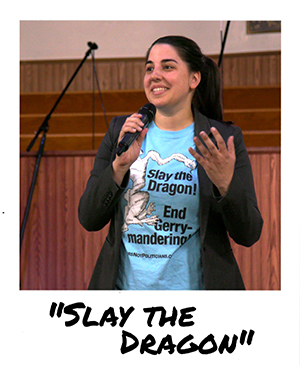 The state of Michigan had seen enough of the damage that gerrymandering does to democracy. How is it, some wondered, that if the majority of all the state’s voters vote Democratic, why are two-thirds of the state’s elected members of Congress Republicans? In 2018, a 26-year-old wrote one night on her Facebook page that she would like to end this corrupt way of drawing district maps that guarantee the majority’s voice from Michigan is not represented in Congress. Immediately, thousands who saw her Facebook post signed up and joined her in what would become a historic campaign to change the state’s Constitution. In doing so, this movement became an inspiration across the nation. And this documentary proves that, sometimes, art can make a serious difference.
The state of Michigan had seen enough of the damage that gerrymandering does to democracy. How is it, some wondered, that if the majority of all the state’s voters vote Democratic, why are two-thirds of the state’s elected members of Congress Republicans? In 2018, a 26-year-old wrote one night on her Facebook page that she would like to end this corrupt way of drawing district maps that guarantee the majority’s voice from Michigan is not represented in Congress. Immediately, thousands who saw her Facebook post signed up and joined her in what would become a historic campaign to change the state’s Constitution. In doing so, this movement became an inspiration across the nation. And this documentary proves that, sometimes, art can make a serious difference.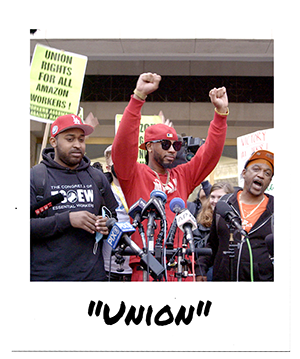 We end our month of Outstanding Arthouse Cinema with Sundance Award Winner UNION — a documentary that followed warehouse workers on Staten Island for a year as they rallied their coworkers to stand up to their behemoth employer, Amazon, and fight for a better future. A rare documentary that is not about true crime, celebrity, gourmet food, rock-climbing, or some historical incident from the distant past. It’s the kind of non-fiction film that seeks to have an immediate impact on the here and now, and we are honored to show it in the state where the labor movement got its start in Flint and Detroit.
We end our month of Outstanding Arthouse Cinema with Sundance Award Winner UNION — a documentary that followed warehouse workers on Staten Island for a year as they rallied their coworkers to stand up to their behemoth employer, Amazon, and fight for a better future. A rare documentary that is not about true crime, celebrity, gourmet food, rock-climbing, or some historical incident from the distant past. It’s the kind of non-fiction film that seeks to have an immediate impact on the here and now, and we are honored to show it in the state where the labor movement got its start in Flint and Detroit. A marvelous classic from the 1930s starring Walter Huston, Ruth Chatterton, Mary Astor and David Niven. This was a time when movie censors in Hollywood (and in D.C.) reigned. Based on the novel, Dodsworth, by Sinclair Lewis (Nobel Prize-winning author of Main Street), one can only imagine what the director, William Wyler (Roman Holiday), had to go through at that time to get a film made dealing not only with the subject of divorce, but with a script that suggested divorce was not a social failing, but perhaps, simply, a good idea. Despite consistently appearing on the “Top Ten Films of All-Time” lists by the filmmakers who make our great movies, DODSWORTH, in the public consciousness, appears to be long forgotten. And yet few films from 1936 crackle and spark like this one!
A marvelous classic from the 1930s starring Walter Huston, Ruth Chatterton, Mary Astor and David Niven. This was a time when movie censors in Hollywood (and in D.C.) reigned. Based on the novel, Dodsworth, by Sinclair Lewis (Nobel Prize-winning author of Main Street), one can only imagine what the director, William Wyler (Roman Holiday), had to go through at that time to get a film made dealing not only with the subject of divorce, but with a script that suggested divorce was not a social failing, but perhaps, simply, a good idea. Despite consistently appearing on the “Top Ten Films of All-Time” lists by the filmmakers who make our great movies, DODSWORTH, in the public consciousness, appears to be long forgotten. And yet few films from 1936 crackle and spark like this one!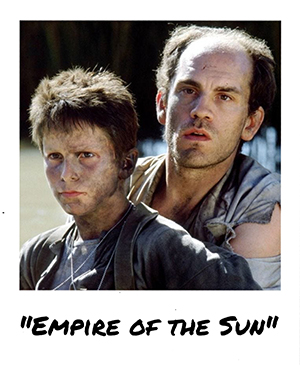 A mostly forgotten masterpiece by the master himself, Steven Spielberg. I don’t need to tell you that when you think of Steven Spielberg’s long and acclaimed filmography, this movie does not instantly come to mind. It should. And after you watch it on August 13th, it will.
A mostly forgotten masterpiece by the master himself, Steven Spielberg. I don’t need to tell you that when you think of Steven Spielberg’s long and acclaimed filmography, this movie does not instantly come to mind. It should. And after you watch it on August 13th, it will. In 1954, just five years after Orwell wrote the book, the BBC, in spite of the controversy that was sure to follow, decided to make the first film version of this iconic opus. Filmed on a TV soundstage with some of Britain’s great, young actors, it has the look and feel that this was shot in the very dystopian future Orwell imagined. Never before seen in the U.S., this is a rare find from the British Film Institute archives. We are proud to present this historic classic to our TCFF audience as part of our year-long celebration of the 70th anniversary of incredible films from the year 1954.
In 1954, just five years after Orwell wrote the book, the BBC, in spite of the controversy that was sure to follow, decided to make the first film version of this iconic opus. Filmed on a TV soundstage with some of Britain’s great, young actors, it has the look and feel that this was shot in the very dystopian future Orwell imagined. Never before seen in the U.S., this is a rare find from the British Film Institute archives. We are proud to present this historic classic to our TCFF audience as part of our year-long celebration of the 70th anniversary of incredible films from the year 1954. Nominated for three Oscars, this unique, and somewhat stunning satire, was virtually overlooked by the American audience. Talk about a forgotten film, this movie is only 2 years old! It’s one of the questions we want to pose in this Lost Gems month: Why are certain – many would say brilliant – films in this current era so quickly disposed of before the public has its chance to make up their own minds? One of our missions with the State Theatre and our film festival has always been to see that this happens less and less. On this day, we invite you to join us in discovering what’s been swept under the rug, and to save this movie from an already semi-organized obscurity.
Nominated for three Oscars, this unique, and somewhat stunning satire, was virtually overlooked by the American audience. Talk about a forgotten film, this movie is only 2 years old! It’s one of the questions we want to pose in this Lost Gems month: Why are certain – many would say brilliant – films in this current era so quickly disposed of before the public has its chance to make up their own minds? One of our missions with the State Theatre and our film festival has always been to see that this happens less and less. On this day, we invite you to join us in discovering what’s been swept under the rug, and to save this movie from an already semi-organized obscurity. While China may be a dictatorship, for some reason they are teaching all of their 3rd graders the importance of elections, and how to run a campaign. This documentary follows one such campaign of a classroom of 8-year-olds who somehow learn that the best way to get elected is to follow what American politicians do to win (i.e., attack their opponents, spread ‘alternate facts’ — and conjure up a juicy 3rd-grade scandal).
While China may be a dictatorship, for some reason they are teaching all of their 3rd graders the importance of elections, and how to run a campaign. This documentary follows one such campaign of a classroom of 8-year-olds who somehow learn that the best way to get elected is to follow what American politicians do to win (i.e., attack their opponents, spread ‘alternate facts’ — and conjure up a juicy 3rd-grade scandal).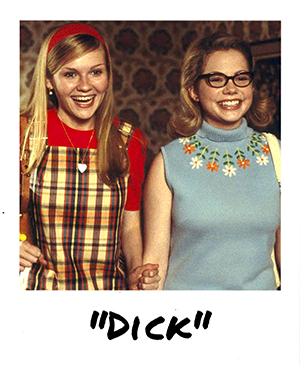
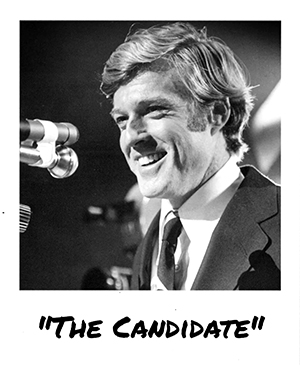 Robert Redford is a tour de force as Bill McKay, the son of a former and powerful California governor (Melvyn Douglas). A political consultant (Peter Boyle) convinces a reluctant McKay to make use of his family’s name to run for the U.S. Senate. McKay has spent his young life fighting for liberal causes which guarantees he has little chance of winning. But with his good looks and oratory skills, he begins to catch on — and realizes that he might actually have a chance of winning… if he tones down his lefty rhetoric and tries to appeal more to the “middle.” He quickly learns that, in politics, selling one’s soul is not so hard after all.
Robert Redford is a tour de force as Bill McKay, the son of a former and powerful California governor (Melvyn Douglas). A political consultant (Peter Boyle) convinces a reluctant McKay to make use of his family’s name to run for the U.S. Senate. McKay has spent his young life fighting for liberal causes which guarantees he has little chance of winning. But with his good looks and oratory skills, he begins to catch on — and realizes that he might actually have a chance of winning… if he tones down his lefty rhetoric and tries to appeal more to the “middle.” He quickly learns that, in politics, selling one’s soul is not so hard after all.